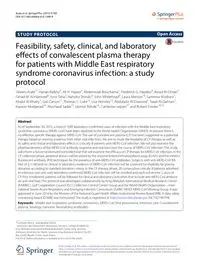
2015 Feasibility, safety, clinical, and laboratory effects of convalescent plasma therapy for patients with Middle East PDF
Preview 2015 Feasibility, safety, clinical, and laboratory effects of convalescent plasma therapy for patients with Middle East
Arabi et al. SpringerPlus (2015) 4:709 DOI 10.1186/s40064-015-1490-9 STUDY PROTOCOL Feasibility, safety, clinical, and laboratory effects of convalescent plasma therapy for patients with Middle East respiratory syndrome coronavirus infection: a study protocol Yaseen Arabi1*, Hanan Balkhy2, Ali H. Hajeer3, Abderrezak Bouchama1, Frederick G. Hayden4, Awad Al‑Omari5, Fahad M. Al‑Hameed6, Yusri Taha7, Nahoko Shindo8, John Whitehead9, Laura Merson10, Sameera AlJohani3, Khalid Al‑Khairy3, Gail Carson11, Thomas C. Luke12, Lisa Hensley13, Abdulaziz Al‑Dawood1, Saad Al‑Qahtani1, Kayvon Modjarrad14, Musharaf Sadat15, Gernot Rohde16, Catherine Leport17 and Robert Fowler18,19 Abstract As of September 30, 2015, a total of 1589 laboratory‑confirmed cases of infection with the Middle East respiratory syndrome coronavirus (MERS‑CoV) have been reported to the World Health Organization (WHO). At present there is no effective specific therapy against MERS‑CoV. The use of convalescent plasma (CP) has been suggested as a potential therapy based on existing evidence from other viral infections. We aim to study the feasibility of CP therapy as well as its safety and clinical and laboratory effects in critically ill patients with MERS‑CoV infection. We will also examine the pharmacokinetics of the MERS‑CoV antibody response and viral load over the course of MERS‑CoV infection. This study will inform a future randomized controlled trial that will examine the efficacy of CP therapy for MERS‑CoV infection. In the CP collection phase, potential donors will be tested by the enzyme linked immunosorbent assay (ELISA) and the indirect fluorescent antibody (IFA) techniques for the presence of anti‑MERS‑CoV antibodies. Subjects with anti‑MERS‑CoV IFA titer of ≥1:160 and no clinical or laboratory evidence of MERS‑CoV infection will be screened for eligibility for plasma donation according to standard donation criteria. In the CP therapy phase, 20 consecutive critically ill patients admitted to intensive care unit with laboratory‑confirmed MERS‑CoV infection will be enrolled and each will receive 2 units of CP. Post enrollment, patients will be followed for clinical and laboratory outcomes that include anti‑MERS‑CoV antibod‑ ies and viral load. This protocol was developed collaboratively by King Abdullah International Medical Research Center (KAIMRC), Gulf Cooperation Council (GCC) Infection Control Center Group and the World Health Organization—Inter‑ national Severe Acute Respiratory and Emerging Infection Consortium (ISARIC‑WHO) MERS‑CoV Working Group. It was approved in June 2014 by the Ministry of the National Guard Health Affairs Institutional Review Board (IRB). A data safety monitoring board (DSMB) was formulated. The study is registered at http://www.clinicaltrials.gov (NCT02190799). Keywords: Middle east respiratory syndrome coronavirus, MERS‑CoV, Viral pneumonia, Intensive care, Convalescent plasma, Serology, Genome, Neutralizing antibodies © 2015 Arabi et al. This article is distributed under the terms of the Creative Commons Attribution 4.0 International License (http://creativecommons.org/licenses/by/4.0/), which permits unrestricted use, distribution, and reproduction in any medium, provided you give appropriate credit to the original author(s) and the source, provide a link to the Creative Commons license, and indicate if changes were made. Open Access *Correspondence:
